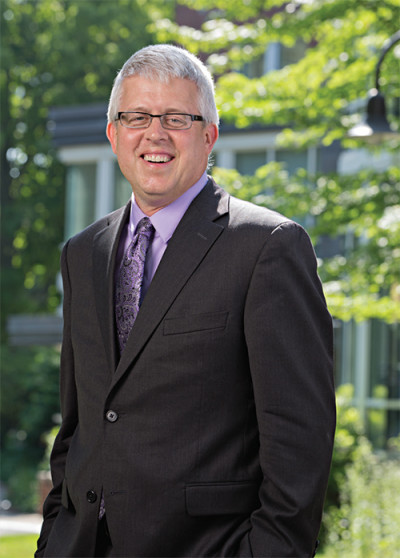
Photo: Patrick O’Connor
Dean Scott Moore
Growing up, Scott Moore liked to teach. He tutored friends and other kids and even helped out his substitute teacher in high school calculus by taking over the class (with her approval) when she didn’t know the material for an upcoming test. But teaching as a profession didn’t occur to him until later in life.
Math also came naturally to Moore, as did history and philosophy. He chose to study math as an undergraduate, and after getting his MSM from the Georgia Institute of Technology—and creating a class in information technology while there—he worked for a human resources association. Technically, he was its director of research, but in addition to running the library and writing a monthly newsletter he also handled the accounting, managed the office staff, wrote a strategic marketing plan, and even cleaned the floors. “I did whatever was needed,” he says.
Finally, though, he could no longer ignore the sense that he ought to be teaching, so Moore went back to school and earned his PhD in information systems from the Wharton School, University of Pennsylvania. For more than 20 years, he taught at the Ross School of Business, University of Michigan, winning not only the admiration of students and co-workers, but also several outstanding teacher awards. For seven years, he was the undergraduate faculty program director as well. Now he has come to Babson to take on the role of Undergraduate dean, and, soon, professor.
Q: What makes you a good teacher?
A: Being able to listen to the students, where they’re coming from. Just really honoring the students and where they are— that they aren’t me. They are them, and it’s my job to help them get to a better place. Also, my interest in the subject—I really, really, really love teaching about business.
Q: What intrigued you about Babson?
A: I’m more comfortable in a small environment. I attended Furman University, a small liberal arts school, and I went by the math department every day. I knew all of them. They knew me, and that was what I needed, and it made a big difference in my life. And I remember that.
Also, Babson’s focus on undergrads and business, and the action-based learning, and the liberal arts—put it all in one big picture, and it was a perfect fit for me. The clincher was people seemed willing to try things and to shut things down if they don’t work, which is a revelation in higher ed.
Q: Why are liberal arts important to a business education?
A: Because that’s what makes a whole person. We aren’t just work. We are the sum of our interests, and liberal arts add color to our life and beauty and joy, and connections to other people and to our past. That is really what education is all about.
Q: So what is the job of an undergrad dean?
A: It was my job this summer to figure that out, because every school is different. I had more than 175 meetings this summer. The idea was to get to know faculty and staff to figure out how they do things here. What has and hasn’t worked before? What gets people upset or excited? I was brought in to supervise the change in the curriculum, job goal number one.
I was brought here to be a hub for activities having to do with undergrads, specifically to work with faculty as the new first-year curriculum gets implemented, and then next year as the sophomore-year curriculum gets implemented. There’s another big curriculum addition that has to go in for the seniors. So I’m going to work across all the different divisions of faculty, and then all the different departments, just to make sure everyone is aware of what everyone else is doing and working together for the benefit of the students. And also to listen to the students. To be out there and hear what’s going on with them.
Q: Will you teach?
A: This year, no. I have plenty to do, but my goal is, absolutely, to get back in the classroom.—Donna Coco
